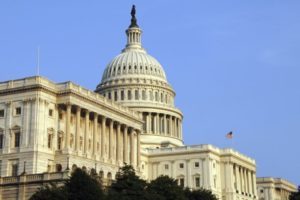 Industry Perspectives on the FAA Reauthorization Act of 2024
Industry Perspectives on the FAA Reauthorization Act of 2024
*Stay tuned for a DRONELIFE exclusive series, explaining FAA Reauthorization for the drone industry
The U.S. House of Representatives approved the Federal Aviation Administration (FAA) Reauthorization Act of 2024 today with a strong bipartisan vote of 387 – 26. This decision follows a similarly overwhelming approval by the Senate last week, which saw the bill pass with an 88 – 4 vote. The bill extends the FAA’s authority through Fiscal Year 2028 and introduces significant directives aimed at advancing uncrewed and powered lift aircraft operations.
The legislation mandates the FAA to issue a notice of proposed rulemaking for Uncrewed Aircraft Systems (UAS) operations beyond visual line of sight (BVLOS) within four months and to publish a final special rule for powered lift aircraft operations within seven months. These steps are viewed as crucial advancements for the Advanced Air Mobility (AAM) industry. Additional measures include enhancements in cyber security, workforce training, and autonomy, among others.
Michael Robbins, President and CEO of the Association of Uncrewed Vehicles and Systems International (AUVSI), expressed his organization’s approval, stating, “AUVSI is proud to announce that the FAA Reauthorization Act includes multiple measures we have advocated for, and which will usher in meaningful progress toward the safe integration of drones and AAM within the national airspace system.” Robbins praised the bipartisan effort in Congress, highlighting its role in reinforcing U.S. global tech competitiveness and the expansion of advanced aviation and autonomy.
Conversely, the bill has faced criticism for its omissions, particularly in the area of counter-drone technology—a critical aspect of national and public safety amid rising drone incidents. Currently, counter drone technology can only be deployed or tested in very limited circumstances by authorized federal entities. Aaditya Devarakonda, CEO of Dedrone, expressed his disappointment: “We are disappointed that Congress failed to include new and enhanced counter-drone authorities for law enforcement and critical infrastructure in the final FAA Reauthorization,” he said. Devarakonda emphasized the necessity of such measures to equip public safety partners adequately against threats posed by malicious drones.
However, Devarakonda also acknowledged the positive developments in the legislation, especially its directives for BVLOS operations, which are expected to significantly enhance the capabilities of drones used in public safety roles. “We applaud Congress for directing the FAA to establish the regulatory framework for beyond visual line of sight drone operations,” he remarked, adding that this will be a “game changer” for law enforcement and the communities they serve.
The legislation will now pass to President Biden’s desk for signature.
Read more:
Miriam McNabb is the Editor-in-Chief of DRONELIFE and CEO of JobForDrones, a professional drone services marketplace, and a fascinated observer of the emerging drone industry and the regulatory environment for drones. Miriam has penned over 3,000 articles focused on the commercial drone space and is an international speaker and recognized figure in the industry. Miriam has a degree from the University of Chicago and over 20 years of experience in high tech sales and marketing for new technologies.
For drone industry consulting or writing, Email Miriam.
TWITTER:@spaldingbarker
Subscribe to DroneLife here.




